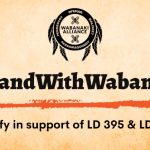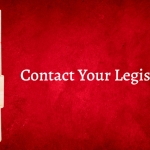The Wabanaki Alliance set a number of legislative priorities for the 131st Maine Legislature, including three measures that are now law and one that advanced a constitutional amendment to the Nov. 7 ballot that was overwhelmingly approved by Maine voters. Find details on these bills below. We also submitted testimony in support of this and other legislation in 2023, which you can read here.
The Alliance is already working on five additional bills that were held over to the second half of the legislative session, which begins in January. Read more about those bills in our Bill Tracker.
📜 Printing Maine’s Tribal Obligations
LD 78: RESOLUTION, Proposing an Amendment to Article X of the Constitution of Maine Regarding the Publication of Maine Indian Treaty Obligations
Sponsor: House Speaker Rachel Talbot Ross, D-Portland
This bill called for restoring language regarding Maine Indian treaty obligations to all printed copies of the Maine Constitution. Enacted by the House and the Senate under the hammer (no roll call), the bill appeared on the Nov. 7 ballot as Question 6 and was decisively approved by Maine voters with 74% of the vote.
Read more »
📜 Parity for the Mi’kmaq Nation
LD 1620: An Act to Enact the Mi’kmaq Restoration Act
Sponsor: Rep. Rachel Talbot Ross, D-Portland
This bill is historic legislation that achieves parity for the Mi’kmaq Nation with the other Wabanaki tribes in Maine. Since 1991 when the Mi’kmaq gained federal recognition, the tribe has been the only Wabanaki Nation without an agreed-upon jurisdictional arrangement with Maine. Establishing the clear jurisdictional status of the Mi’kmaq Nation will allow its tribal government to be approved for more federal and state discretionary funds, grants, and loans that will benefit both its citizens and the region.
Read more »
📜 Preserve and Strengthen Wabanaki Families
LD 1970: An Act to Enact the Maine Indian Child Welfare Act
Sponsor: Sen. Donna Bailey, D-York
This bill preserves and strengthens Penobscot, Passamaquoddy, Mi’kmaq and Maliseet families in Maine by preventing out-of-home placement whenever possible. Its goals are to maintain family ties, reunify families, and provide kinship/tribal permanency plans for children who cannot return home. By enacting this bill, Maine joins at least 12 other states that have codified Indian Child Welfare Act protections on the state level.
Read more »
📜 Fair Compensation for Law Enforcement
LD 229: An Act to Compensate Tribal Governments for Basic Training for a Law Enforcement Officer Hired by Another Government Agency
Sponsor: Rep. James F. Dill, D-Old Town
This bill adds tribal governments and full-time law enforcement officers trained in the U.S. Indian Police Academy at the Federal Law Enforcement Training Center to the list of governments eligible for reimbursement.
Read more »
📜 Restore Access to Federal Laws
LD 2004: An Act to Restore Access to Federal Laws Beneficial to the Wabanaki Nations
Sponsor: Rep. Rachel Talbot Ross, D-Portland
This legislation would have amended the 1980 Maine Indian Claims Settlement Act and the Aroostook Band of Micmacs Settlement Act so that the Wabanaki tribes would benefit from most existing and future federal laws that apply to the other 570 federally recognized tribes. It passed with broad bipartisan support in the House 100-47 and the Senate in a 26-8 vote. Gov. Janet Mills’ veto was sustained when the House fell short of the two-thirds required for the bill to become law over the governor’s objections.
Read more about the bill and our statement on the veto.







